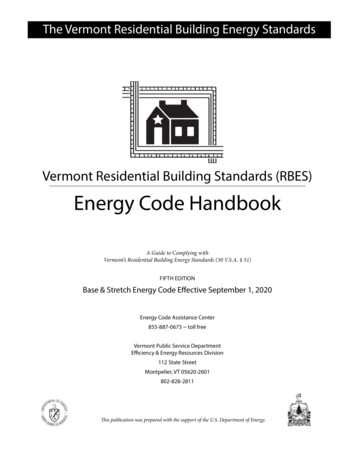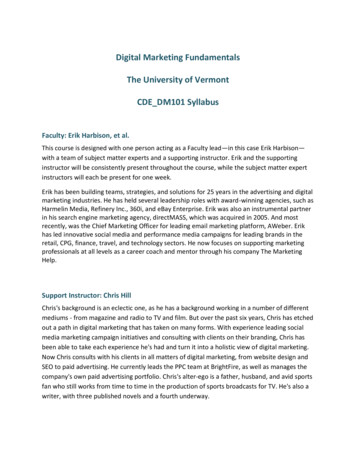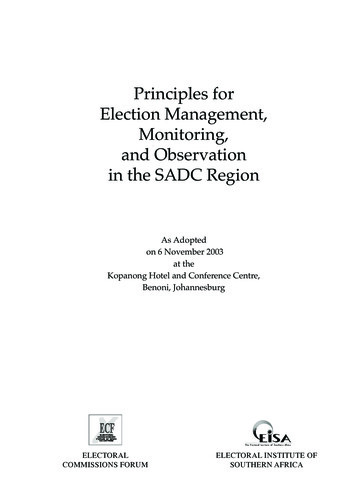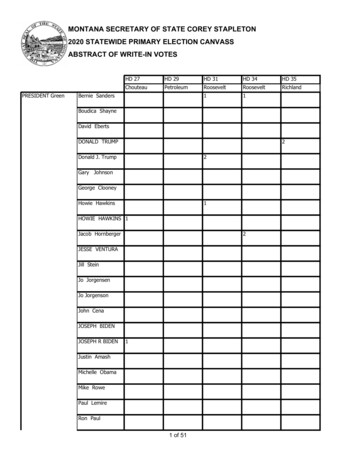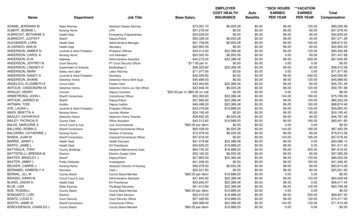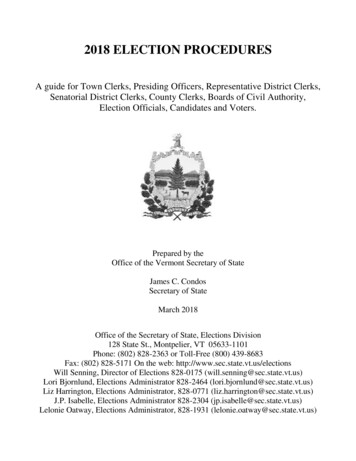
Transcription
2018 ELECTION PROCEDURESA guide for Town Clerks, Presiding Officers, Representative District Clerks,Senatorial District Clerks, County Clerks, Boards of Civil Authority,Election Officials, Candidates and Voters.Prepared by theOffice of the Vermont Secretary of StateJames C. CondosSecretary of StateMarch 2018Office of the Secretary of State, Elections Division128 State St., Montpelier, VT 05633-1101Phone: (802) 828-2363 or Toll-Free (800) 439-8683Fax: (802) 828-5171 On the web: http://www.sec.state.vt.us/electionsWill Senning, Director of Elections 828-0175 (will.senning@sec.state.vt.us)Lori Bjornlund, Elections Administrator 828-2464 (lori.bjornlund@sec.state.vt.us)Liz Harrington, Elections Administrator, 828-0771 (liz.harrington@sec.state.vt.us)J.P. Isabelle, Elections Administrator 828-2304 (jp.isabelle@sec.state.vt.us)Lelonie Oatway, Elections Administrator, 828-1931 (lelonie.oatway@sec.state.vt.us)
The Vermont Constitution: A Word on ElectionsChapter I, Article 8 of the Vermont Constitution requires:"That all elections ought to be free and without corruption, and that all voters, having asufficient, evident, common interest with, and attachment to the community, have a right to electofficers, and be elected into office, agreeably to the regulations made in this constitution."This is not just a homily. The purity and basic fairness of Vermont elections is both a philosophicaland practical objective of our social and political lives as Vermonters. We begin this review of thePrimary and General Elections by proudly repeating the purposes of the Vermont election laws, asexplained in 17 V.S.A. §2101: to provide equal opportunity for all citizens of voting age to participate in political processes; to assure that political campaigns are fairly and honestly conducted and financed; to define unacceptable conduct among political candidates and public servants; to insure that public service will be in the public interest, rather than the special interest ofgroups or individuals; to encourage citizens to become more actively involved in the political processes which affectthe quality of life; and to provide uniform practices and procedures in the conduct of elections throughout the state.
IntroductionMembers of our Boards of Civil Authority know that there is more to running Vermont’s elections thanchecklists and tabulators. In fact, the biggest challenge for those charged with running Vermont’selections is doing what needs to be done next -- before the deadline passes.At the Office of the Secretary of State we work hard to help ensure that Vermont’s local officials runall elections in a proper and legal manner. The “2018 Election Procedures--A Guide for ElectionOfficials” is designed to be used as an overview of the election process and as a step-by-step referencefor election officials for conducting elections. This guide is supplemented during the election year byElections Bulletins sent out by the Elections Division to the town clerks as a reminder of the variousrequirements of election administration as deadlines near.A detailed 2018 Elections Calendar is available on the Elections page of the Secretary of State’s website at http://www.sec.state.vt.us/elections.This year, Vermont has three major parties that will be holding primaries the second Tuesday ofAugust: Democratic, Progressive and Republican. It is a year in which we will elect a U.S. Senator, ourU.S. Representative, all six statewide offices, all 30 members of the State Senate, all 150 members ofthe Vermont House of Representatives, probate judges, assistant judges, state’s attorneys, sheriffs, highbailiffs, and justices of the peace.We have a lot of work to do! I am very pleased that we have a great Elections Division staff to serveyou. As always, we encourage you to call us for additional information or assistance.James C. CondosSecretary of StateCall Toll Free 1-800-439-8683, or call directJim Condos, Secretary of State, 828-2148Will Senning, Director, 828-0175Lori Bjornlund, Elections Administrator, 828-2464Liz Harrington, Elections Administrator, 828-0771J.P. Isabelle, Elections Administrator, 828-2304Lelonie Oatway, Elections Administrator, 828-1931
Table of ContentsPageI.II.III.IV.V.Overview of Administrators of Statewide Elections1A.B.C.D.1233The Secretary of State, BCA, Town Clerk & Presiding OfficerRepresentative, Senatorial and County ClerksSuperior Court ClerksElection OfficialsElection Related Responsibilities of Town Clerks & BCA4A.B.C.D.E.F.H.4455556Voter Registration and Statewide ChecklistQualifications to Become a Legal Voter in VermontMilitary and Overseas VotersDenying an ApplicationChallenging a Voter on the ChecklistChecklist MaintenanceAdditional Duties of the BCAFiling Procedures for Petitions and Consent Forms for Major PartyCandidates7A. Primary Petition, Consent, and Financial Disclosure FormsB. Petition SignaturesC. Primary Election Winners778General Election Party Nomination and Independent Candidate Petition9A.B.C.D.E.Independent candidatesNomination of Candidates by Party CommitteeCandidates Nominated by More Than One PartyJustice of the PeaceIndependent Candidates for Justice of the Peace99101011Pre-Election Responsibilities- ALL Statewide 6Justice of the Peace and Municipal Special Meeting ArticlesPosting Warnings and Checklists Prior to ElectionPrimary Election Ballot & General Election Ballot DistributionPre-Election Signs Placed by Candidates or CitizensCopies of the ChecklistMaterials to be Delivered to Polling PlaceProcedures for Early Absentee Ballots Prior to ElectionRequests for Early Voter/Absentee BallotsReturn of Early Voter/Absentee BallotsDefective Absentee Ballots
VI.VII.VIII.Election Day Duties—From Opening the Polls Until the Polls ning the PollsPollwatchersCampaigning Outside the Polling PlaceSigns Outside the Polling PlaceButtons, Campaign Literature, Stickers or LabelsProcessing Absentee Ballots on Election DayIn-Person Voting ProceduresProcedure if Name Not Found on ChecklistReplacement BallotsClosing the PollsElection Duties After the Polls Close and the Next 48 siding Officer Directs All Ballot Counting ProceduresProcedures for Accuvote Optic Scan Tabulator TownsProcedures for Hand Count TownsSecuring and Storing Ballots, Tally Sheets and ChecklistsElection Night Reporting and Filing the Official Return of VotesCertificate of Election to the Justice of the Peace CandidatesCanvassing Committees Duties Following the PrimarySpecial Counting Rules for the Primary ElectionCanvassing for the General ElectionVoter Participation Entered into VEMSRecounts and Contests of Election26AppendicesA.Request for Early or Absentee Voter BallotB.Ballot Bag Packing InstructionsC.Vermont Voter Affidavit Form for Undelivered or Lost Absentee BallotsD.Sworn Affirmation of Residence/Domicile for Challenged VotersE.Vermont Voter Bill of RightsF.Notice to Voters – Instructions for Marking Your BallotG.Sample Local Justice of the Peace Ballot for Paper Ballot TownsH.Defective Ballot EnvelopeI.Replaced Ballot EnvelopeJ.Defective BallotK.Counting Rules for All Towns- Voter IntentL.Administrative Complaint ProcedureM.Rule on What Constitutes a Vote
I. Overview of Administrators of Statewide ElectionsThe primary and general elections in Vermont are administered through teamwork between the Secretaryof State, who is the chief election official of Vermont; the 246 local election boards known as the Boardof Civil Authority in each town or city; the town clerk, also a member of the BCA; additional electionofficials appointed by the Board of Civil Authority; and the fourteen county clerks.The Secretary of State (SOS) employs a director of elections and four election administrators. TheElections Division provides information and training about election law and procedures to local electionofficials, parties, candidates, and citizens. The Elections Division reviews petitions and consent forms,prepares and distributes ballots and the Official Return of Votes (used to report election results) for allvoting districts, and reports election results. All candidates file campaign finance reports with the SOS.The Board of Civil Authority (BCA) of each town or city (except where local charters may providedifferently, such as Burlington and Rutland City) is composed of the town clerk, the members of the localselectboard or city council and the justices of the peace (JPs) elected every two years in the GeneralElection (5 to 15 JPs depending upon the population of the town). The BCA is in charge of the conductof elections within the municipality. BCA members should serve as election officials at polling places onElection Day whenever possible. §24511.The BCA establishes policy; makes decisions involving voter registration and challenging and purgingvoters; determines polling places and hours; members serve as election officials at the polling place; andjustices of the peace may deliver absentee ballots to voters who are ill or who have a disability whorequest personal delivery. If there are not enough BCA members to serve on Election Day or to deliverballots, the BCA shall appoint additional registered voters of the town to serve as election officials.§2454.A quorum of at least three members of the BCA must be present and in agreement to take official action,except on Election Day, when any number present, even if only one, can take action. §2103(5), §2451.Although one BCA member can make decisions on Election Day regarding additions to the checklist tocorrect inadvertent mistakes or regarding challenges to voters, there must be at least two sworn electionofficials at the polling place at all times on Election Day. We strongly recommend that even thesmallest towns plan to have at least three election officials present at all times. In order to protect theintegrity of the election, no election official should be alone at the polling place from the opening of thepolls until the count is completed, ballot bags sealed, and materials are locked in the town clerk’s vault.If a town does not have at least three BCA members belonging to one of the major parties, any threevoters in the town, or the town chair of that political party, can submit a list of names and request that theselectboard appoint additional members to the BCA, for election purposes only, from its proposed list sothat the major party will have at least three members serving on the BCA. Any BCA members appointedunder this provision serve ONLY AS ELECTION OFFICIALS. These appointees do not become JPs,cannot perform marriages, and cannot participate in tax appeals or tax abatements. §2143.The Town Clerk is the key player in the preparation for and the administration of the Primary andGeneral Elections. The town clerk maintains voter information on the statewide checklist, posts allnotices and warnings, processes absentee ballots, serves as presiding officer at the polling place, andprepares and submits the Official Return of Votes (with another election official).The Presiding Officer is the chief election official at each polling place. The town clerk is the presidingofficer unless the town has voted otherwise, the clerk is unavailable, or there is more than one pollingplace in the town. If the town clerk is unavailable or there are multiple polling places, the BCA appointsa registered voter to serve as presiding officer. §2452. Presiding officers are required by law to attend oneelection workshop presented by the SOS every two years and must certify with the SOS by December 31of even-numbered years that they have attended a training. §2457(b).1Unless otherwise noted, all sections referred to are in Title 17 of the Vermont Statutes.1
Representative District Clerks are town clerks who are assigned additional responsibilities related to theelection of the 150 State Representatives. Vermont statutes designate the town clerk of the whole townwith the largest population within each representative district as representative district clerk. These townclerks will continue to serve as representative district clerks until the General Assembly finishesreapportionment creating new districts for the 2022 elections following the 2020 census. §2103(29).Representative district clerks: accept primary petitions and consent forms from major party candidates for state representative.(Independent and minor party candidates must file petitions and consent forms with the SOS inMontpelier—DO NOT accept these forms.); for all major party candidates who properly file petitions with the required 50 signatures alongwith a consent form, enter the candidate’s information into the Vermont Elections ManagementSystem (VEMS)—DO NOT accept a petition without a consent form!!; chair a canvassing committee following the Primary and General Elections to tabulate electionresults for the representative district (an election bulletin will be emailed to each representativedistrict clerk prior to the canvass with procedural details); send completed Certificates of Election to the winning candidate(s); upload the signed canvass report (election results) for the representative district into VEMS;Senatorial District Clerks are 12 of the county clerks who are designated by state statute to performadditional duties related to the election of 30 State Senators (Essex and Orleans Counties are combinedin one senatorial district with the Orleans County Clerk serving as senatorial district clerk and theChittenden County Clerk serves as clerk for both the Chittenden and Grand Isle Senate Districts).Senatorial district clerks: accept primary petitions and consent forms from major party senatorial candidates;(Independent and minor party candidates must file petitions and consent forms with the Office ofthe SOS in Montpelier—DO NOT accept these forms.); for all major party candidates who properly file petitions with the required 100 signatures alongwith a consent form, enter the candidate’s information into the Vermont Elections ManagementSystem (VEMS)—DO NOT accept a petition without a consent form!!; chair a canvassing committee following the Primary and General Elections to tabulate electionresults for the senatorial district (an election bulletin will be emailed to each senatorial districtclerk prior to the canvass with procedural details); send completed Certificates of Election to winning candidates; upload the signed canvass (election results) for the state senatorial district into VEMS;County Clerks: accept petitions and consent forms from major party candidates for county office; for all candidates who properly file petitions with the required 100 signatures along with aconsent form, enter the candidate’s information into the Vermont Elections Management System(VEMS)—DO NOT accept a petition without a consent form!!; chair a canvassing committee following the Primary and General Elections to tabulate electionresults for county offices (an election bulletin will be emailed to each county clerk prior to thecanvass with procedural details); send completed Certificates of Election to winning candidates; upload the signed canvass report (election results) for the county offices into VEMS;2
Superior Court Clerks: accept petitions for recounts after the Primary or General Elections from candidates for staterepresentative, state senate and county offices if the difference between a winning candidate and alosing candidate is less than 2% of the total votes cast for all candidates in the race divided by thenumber of candidates. The percentage for state representative candidates is 5%; accept petitions to contest elections. County clerks manage all recounts within the county under the supervision of the Superior CourtJudge. §§2601, 2602.Election Officials are registered voters of the town who are appointed by the BCA as needed or to ensurepolitical party balance and can include assistant town clerks (who may serve as election officials even ifthey are not registered voters of the town). §2454. All appointed election officials must be sworn inbefore entering upon their duties. Sixteen and seventeen-year-olds can be appointed as assistantelection officials working under the direct supervision of adult election officials, but are not sworn inbecause they are under 18 and therefore cannot take oaths.The oaths required for election officials are set out in the Vermont Constitution. They are asfollows:I (give name) do solemnly swear (or affirm) that I will be true and faithful to the State ofVermont, and that I will not, directly or indirectly, do any act or thing injurious to theConstitution or Government thereof. (If an oath) So help me God. (If an affirmation) Under thepains and penalties of perjury.I (give name) do solemnly swear (or affirm) that I will faithfully execute the office ofassistant election official for the town of (give town) and will therein do equal right and justiceto all persons, to the best of my judgment and ability, according to law. (If an oath) So help meGod. (If an affirmation) Under the pains and penalties of perjury.Disqualification of Election OfficialsIn certain cases, members of the BCA or election officials may not serve at a particular election due to astatutory disqualification. No person who is a candidate for an office in a contested race whose nameis printed on the ballot may serve as an election official for that election EXCEPT if the person is acandidate for justice of the peace, town clerk, treasurer, moderator, or in charter towns, for anotherelection official position such as ward clerk. For example, if a town clerk or justice of the peace isrunning for state representative, the clerk or JP cannot serve as a presiding officer or election official.However, if a person is ONLY running for JP or town clerk, then the person can serve as an electionofficial, but we recommend they do not count the ballots for their own race. §2456. When a candidate isdisqualified from serving as an election official, then that candidate's spouse, parent or child cannotdeliver absentee ballots to voters who are ill or who have a disability. §2538(a)(4).*Whenever possible, the best practice is to avoid even the suggestion of a lack of impartiality. So,even if a candidate is permitted by the statutes to serve as an election official, do not have the candidatecount ballots for the office that he or she is seeking. The standards of voters are often higher than thestandards of the law, and while you are obliged only to follow the law, a little prudence goes a long way.Assignments and Compensation of Election OfficialsThe presiding officer makes assignments of the hours and duties of election officials. The presidingofficer must sometimes make difficult decisions to assign the person with the best skill set for a particularduty even if someone else has traditionally performed that function. Please accept and support yourpresiding officer’s decisions with grace—the accuracy and integrity of the election is paramount.§2455.The compensation, if any, of those who deliver absentee ballots is established by the BCA. §2538(a)(5).Compensation of election officials, if any, is determined by the electorate at town meeting as part of thenormal budget process, or in lieu of a town vote, by the selectboard. Some towns pay wages while othertowns ask for and receive volunteer service.3
II. Election Related Responsibilities of Town Clerks and BCACertain election related duties are performed by the town clerk and local BCA throughout every year,and are not necessarily related to a particular election. These duties include:Voter Registration and Statewide Voter Checklist DutiesTown clerks must add, edit, challenge and purge voters from the voter checklist. Please review theVEMS User Manual for details on performing voter registration related actions in that system, or contactone of the Elections Administrators with questions or to request training. All clerks must check theiremail for Election Bulletins on a daily basis.Individuals may register to vote during the town clerk’s normal business hours on any day up to ElectionDay and may register at the polling place during polling hours on Election Day. §2144(a) and (b).Vermont law gives the town clerk the authority to add names to the checklist. If an application meets therequirements, the person’s name must be added to the checklist within three days of the clerk receivingthe application. §2144b. If a town clerk is uncertain if a person meets the requirements, the town clerkshould request a meeting of the BCA to review any questionable applications. BCA meetings require fivedays written notice to each member of the board and posting a notice in at least two public places at leastfive days before the meeting. 24 V.S.A. §801. If the board denies the application, the clerk must send anotice with reason(s) for the denial to the person's last known address §2146(b). The rejection notice mustinform the applicant that, any person whose application to vote has been rejected or whose name has beenremoved from the checklist may appeal to Superior Court. §2148.Periodically, or at least five days prior to each election, the town clerk is required to forward a list ofadditions to the checklist to the BCA. §2144b(d).Meetings of the board of civil authority, except for Election Day meetings, use a present and votingstandard for a quorum, but require at least three members present and in agreement to take official action.§2103(5). On Election Day, a quorum of the BCA consists of those members present at the polls.§2451. Therefore, on Election Day, if no other members of the BCA are present, the town clerk or anyBCA member can add a name to the checklist or take other official action. §2147.No application to the BCA is required when a voter moves to a new location in the same town or changestheir name. If the voter notifies the clerk, or if a change of address or name comes from the Departmentof Motor Vehicles, the clerk simply makes the changes on the checklist.Qualifications to Become a Registered Voter in VermontA person may be added to the voter registration checklist if that person: (1) is a citizen of the UnitedStates; (2) is a resident of the town or city in Vermont where the application is submitted; (3) is 18 yearsof age or older by the General Election date; and (4) has taken the Voter's Oath. Any person meeting therequirements above who will be 18 years of age on or before the date of a General Election may registerand vote in the Primary Election immediately preceding that General Election. 17 V.S.A §2121(b).Sometimes a person misunderstands and believes that a resident-alien “green” card allows one to registerto vote, but it does not. A person must become a U.S. citizen, not a resident-alien, in order to register.It is the "residency" issue where most questions arise. §2122(b) provides:A person may have their name on the checklist only in the town in which the person is aresident. For the purpose of this section, "resident" shall mean a person who is domiciled inthe town as evidenced by an intent to maintain a principal dwelling place in the townindefinitely and to return there if temporarily absent, coupled with an act or actsconsistent with that intent. If a person moves to another town with the intention of remainingthere indefinitely, the person shall be considered to have lost his residence in the town in whichhe originally resided even though he intends to return at some future time. However, a personshall retain the ability to vote in a town of former residence for a period of 17 days afterbecoming a resident of a new town. A person may have only one residence at a given time.4
Intent is the key. What about a student in a dorm, living nine months of the year in Vermont andintending to remain in Vermont indefinitely? Case law tells us the college student can choose his primaryresidence but cannot be registered in two places. Or, what about an owner of houses in two Vermonttowns, living in one and renting out the other house, but intending to return to the rented house when heor she retires? As long as the person is only claiming one town as a principal dwelling place and is not onany other checklist, he or she may qualify to register and vote. There can be complicated factualquestions involving residency. However, as long as a person is not registered and voting in two places,the Vermont statutes appear to place the most emphasis on the intent of the voter if temporarily absent,and Vermont court cases uphold this statutory standard.The law on residency and voter registration checklists also provides that the town clerk and BCA musttreat each applicant equally. The law prohibits the BCA from requiring applicants to complete anyform other than the “Application to the Checklist” or from requiring that all applicants or anyparticular class of applicants appear before the BCA or submit additional information. §2145(c).Denying an ApplicationOn a case-by-case basis the BCA can conduct an inquiry into a person’s eligibility if the town clerk or theBCA has reason to question residency or other information on an application. On demand of a majoritypresent (at least three members for a majority, except on Election Day, when any number of BCAmembers present at the polls may act, even if only one is present) the BCA may require that an applicantbe examined, under oath, concerning the facts stated in the application. The board may also make suchinvestigation as it deems proper to verify any statement made under oath by an applicant. §2146(a). Seethe statute for details.Military and Overseas VotersFederal law requires that U.S. citizens have the right to maintain their status as voters in the last placewithin the United States where they had established residency, while citizens, their spouses anddependents, are serving in the military (in the U.S. or outside) or while citizens are living outside of theUnited States. 42 U.S.C. §1973cff and §2122(a). Whether in military service (in the U.S. or abroad), orliving by choice abroad, a person can maintain residency for voting purposes indefinitely in the last townof former residence in the United States until the person returns to the U.S.Challenging a VoterTo challenge a voter (because the BCA believes the voter no longer resides in town) or to purge a person'sname from the checklist, the BCA must follow the detailed guidance provided in §2150 and in periodicElections Bulletins to town clerks regarding the challenge and purge procedures.Records of Voter Registration; Checklist MaintenanceCompleted applications for addition to the checklist, or an electronic copy thereof, must be retained untilthe end of the General Election cycle following the one in which they were submitted. For example, anapplication submitted during the current 2018 election cycle must be retained until the end of the 2020general election cycle.The town clerk must keep records of actions by the BCA to maintain the checklist. Minutes must be keptof each BCA meeting. The records must include the reason for removal of each voter. This may includekeeping a copy of the written request, a copy of the new registration form or making notations in thecomments section of the Statewide Checklist. The minutes need to include the names of all boardmembers present and all members of the public who participated in the meeting; all motions made, actiontaken, and the results of all votes. 1 V.S.A. §312.5
Voter Registration for Primary and General Elections for Residents of Gores and/or UnorganizedTowns -- Residents of gores and unorganized towns can register for state and federal elections only inany town that is in the county, senatorial district, and representative district in which he or she resides.When printing a local checklist, residents of Unorganized/Unified towns and gores will not be included (ifyou have entered the voter correctly in VEMS) or you can add a notation that will be clear to electionofficials at the polling places that these voters can only vote in state and federal elections. Many clerksadd a “G” in the suffix field. Residents of gores and unorganized towns cannot vote in town elections,town school board elections, or union high school elections. §2123.Additional Duties of the BCA before Election DayThere are a number of decisions the BCA must make before elections: The proper number of voting booths. §2504. Your town needs to have enough voting booths so thatvoters are not held up for more than 10 minutes waiting for a booth. Designates the location of polling place or places (although voters may petition to decide on otherpolling places at a duly warned annual or special meeting). §2501. ALL polling places must beaccessible to voters with disabilities. The BCA must take measures to assure that elderly voters andvoters with a disability may conveniently and secretly cast their votes. §2502. There must bedesignated handicapped parking outside a polling place, and no person should be permitted in ahandicapped space for longer than the time needed to vote. At least 30 days prior to every election, the town clerk must report their polling place(s) to the SOS’sOffice. Location of polling places is a question we include every year on our Town Meeting Surveythat all clerks complete. By answering this question on the survey you have met the requirement toreport these polling locations to our office. Locations may only be changed within 30 days of anelection in cases of emergency and those changes must be reported to the SOS within 24 hours.§2502(c)(1). Voters who are ill or who have a disability can also ask two election officials to deliver a ballot to theparking area to vote (curbside voting). A polling place accessibility guide from the U.S. Departmentof Justice can be downloaded at https://www.ad
Primary and General Elections by proudly repeating the purposes of the Vermont election laws, as explained in 17 V.S.A. §2101: . The primary and general elections in Vermont are administered through teamwork between the Secretary of State, who is the chief election official of Vermont; the 246 local election boards known as the Board .
